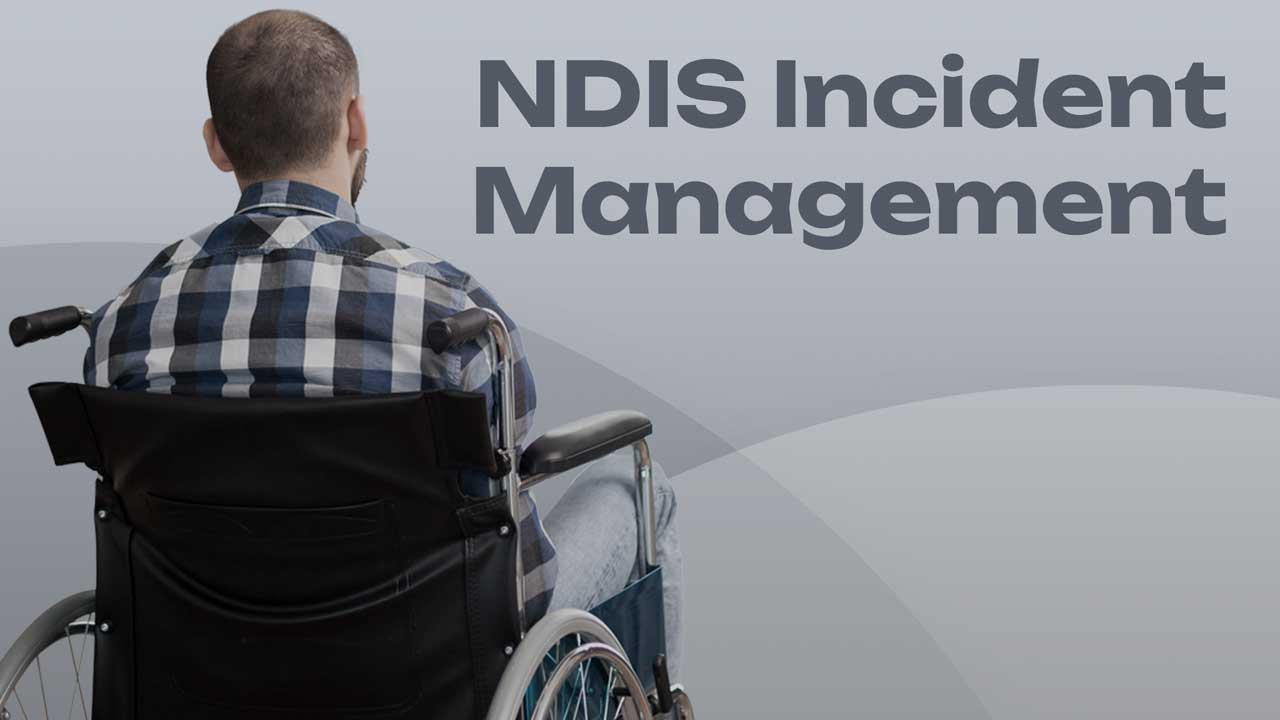All registered providers of National Disability Insurance Scheme (NDIS) services are expected to meet specific criteria relating to incident management (NDIS 2022a).
Incident management is crucial to ensuring safe and high-quality supports and services for NDIS participants (NDIS 2022a).
Incident Management in the NDIS Practice Standards
Incident management is a requirement of the NDIS Practice Standards under Core Module 2: Provider Governance and Operational Management.
This Practice Standard aims to ensure that:
- NDIS participants are safeguarded by the provider’s incident management system
- Incidents are acknowledged, responded to, appropriately managed and learned from.
(NDIS 2021)
NDIS providers must meet the following quality indicators:
- The provider maintains an incident management system that is relevant and proportional to the size and scale of the provider, as well as the scope and complexity of the services being delivered. The system complies with the National Disability Insurance Scheme (Incident Management and Reportable Incidents) Rules 2018.
- NDIS participants are provided with information related to incident management, including how incidents that involve the participant have been managed.
- There is demonstrated continuous improvement of the provider’s incident management system through:
- Regular reviews of policies and procedures
- Reviews of the causes, handling and outcomes of incidents
- Input from participants and staff
- The use of feedback.
- All staff are aware of, trained in, and comply with incident management procedures.
(NDIS 2021)
What is an Incident?
Firstly, let’s define the term incident.
Under the NDIS, an incident is an act, omission, event or circumstance that meets certain criteria. An incident may be:
- An act, omission, event or circumstance that occurred in connection to the provision of care to an NDIS participant that did, or could have, resulted in harm to the participant.
- An act performed by an NDIS participant in connection with the provision of care that caused serious harm, or the risk of serious harm, to another person.
- A reportable incident that occurred, or was alleged to have occurred, in connection to the provision of care to an NDIS participant.
(NDIS 2022a)

The phrase ‘in connection with’ is purposely broad in order to cover incidents that:
- Occur during the provision of supports or services
- Occur due to the provision, alteration or withdrawal of supports or services
- Occur due to the provision of care, but not necessarily during the provision of supports or services.
(NDIS 2019)
Where Might Incidents Occur?
- The NDIS participant’s home
- A residential care setting
- Supported accommodation
- The premises of the provider
- In the community (if the provider is supporting the participant in accessing the community).
(NDIS 2019)
What is a Reportable Incident Under the NDIS?
Reportable incidents are actual or alleged events that the NDIS Commission must be notified of. These include the following events that occur in connection with the provision of care:
| Reportable Incident | Examples |
|---|---|
Death of an NDIS participant |
Any deaths that occur in connection with the provision of NDIS supports, including:
|
Serious injury of an NDIS participant |
|
Abuse or neglect of an NDIS participant |
|
Unlawful sexual or physical contact with, or assault of, an NDIS participant (unless where contact is made but it is considered negligible) |
|
Sexual misconduct committed against, or in the presence of, an NDIS participant |
|
Unauthorised use of restrictive practice against an NDIS participant |
|
(NDIS 2019)
These incidents must be reported to the NDIS Commission within 24 hours of key personnel from the provider becoming aware of the event or alleged event (within five business days for restrictive practices) (NDIS 2022b).
Notification of Reportable Incidents to the NDIS
The notification must include:
- Name and details of the NDIS provider
- Name and details of the person making the notification
- Name and details of the people involved in the reportable incident (including the NDIS participant)
- Name and details of any subjects of the allegation
- Description of the reportable incident
- Time, date and place of the incident (if known)
- Description of the impact or harm caused to the NDIS participant (except for cases of death)
- Immediate actions that were taken in response to the incident, including:
- Actions related to the health, safety and wellbeing of the NDIS participant
- Any medical treatment that was provided
- Whether the incident was reported to police or other authorities.
(NDIS 2019)
What is an Incident Management System?
The term incident management system describes a group of processes and procedures for managing incidents. If implemented effectively, an incident management system may reduce the risk of preventable death or injury (NDIS 2022a).
NDIS providers are responsible for establishing and maintaining an incident management system that addresses any incidents that occur while providing services and supports (NDIS 2022a).
An appropriate incident management system should include procedures for:
- Identifying incidents
- Assessing incidents
- Recording incidents
- Managing incidents
- Resolving incidents
- Reporting incidents.
(NDIS 2022a)
The Incident Management Process
- A staff member identifies an incident or is informed of an allegation of an incident.
- The staff member immediately acts to ensure the affected person’s safety and wellbeing.
- The staff member follows incident management system processes, including:
- Reporting the incident to relevant personnel
- Protecting any evidence
- Notifying the affected person’s family or support personnel
- Contacting relevant authorities (e.g. police).
- Relevant personnel conduct an assessment of the incident.
- Relevant personnel decide whether the incident is reportable.
- If the incident is reportable:
- The NDIS Commission is notified and the reportable incident process is followed
- The provider investigates the incident or undertakes other actions as directed by the NDIS Commission
- The provider takes action in response to the incident
- The NDIS Commission is kept updated on the situation. Any requests or directions from the Commission are followed
- If the incident is not reportable:
- The provider takes action in response to the incident.
(NDIS 2019)
Corrective Actions in Response to Reportable Incidents
While some incidents will not require further action to be taken, some situations may require corrective steps, such as:
- Disciplinary action
- Staff dismissal
- Staff training or education
- Service environment modification
- The development or amendment of policies and procedures
- Changes to the method of service delivery
- Improvements in practice.
(NDIS 2019)
Test Your Knowledge
Question 1 of 3
Which one of the following is an example of a non-reportable incident?
Topics
References
- NDIS Quality and Safeguards Commission 2022a, Incident Management (All Providers), Australian Government, viewed 17 July 2024, https://www.ndiscommission.gov.au/providers/complaints-and-incidents/managing-incidents/incident-management-all-providers
- NDIS Quality and Safeguards Commission 2022b, Incident Management (For Providers), Australian Government, viewed 17 July 2024, https://www.ndiscommission.gov.au/providers/complaints-and-incidents/incident-management-providers
- NDIS Quality and Safeguards Commission 2021, NDIS Practice Standards: NDIS Practice Standards and Quality Indicators, Australian Government, viewed 17 July 2024, https://www.ndiscommission.gov.au/sites/default/files/2024-05/ndis-practice-standards-and-quality-indicatorsfinal1_1.pdf
- NDIS Quality and Safeguards Commission 2019, Reportable Incidents, Australian Government, viewed 17 July 2024, https://www.ndiscommission.gov.au/sites/default/files/2022-02/detailed-guidance-reportable-incidents-detailed-guidance-registered_0.pdf
 New
New 
